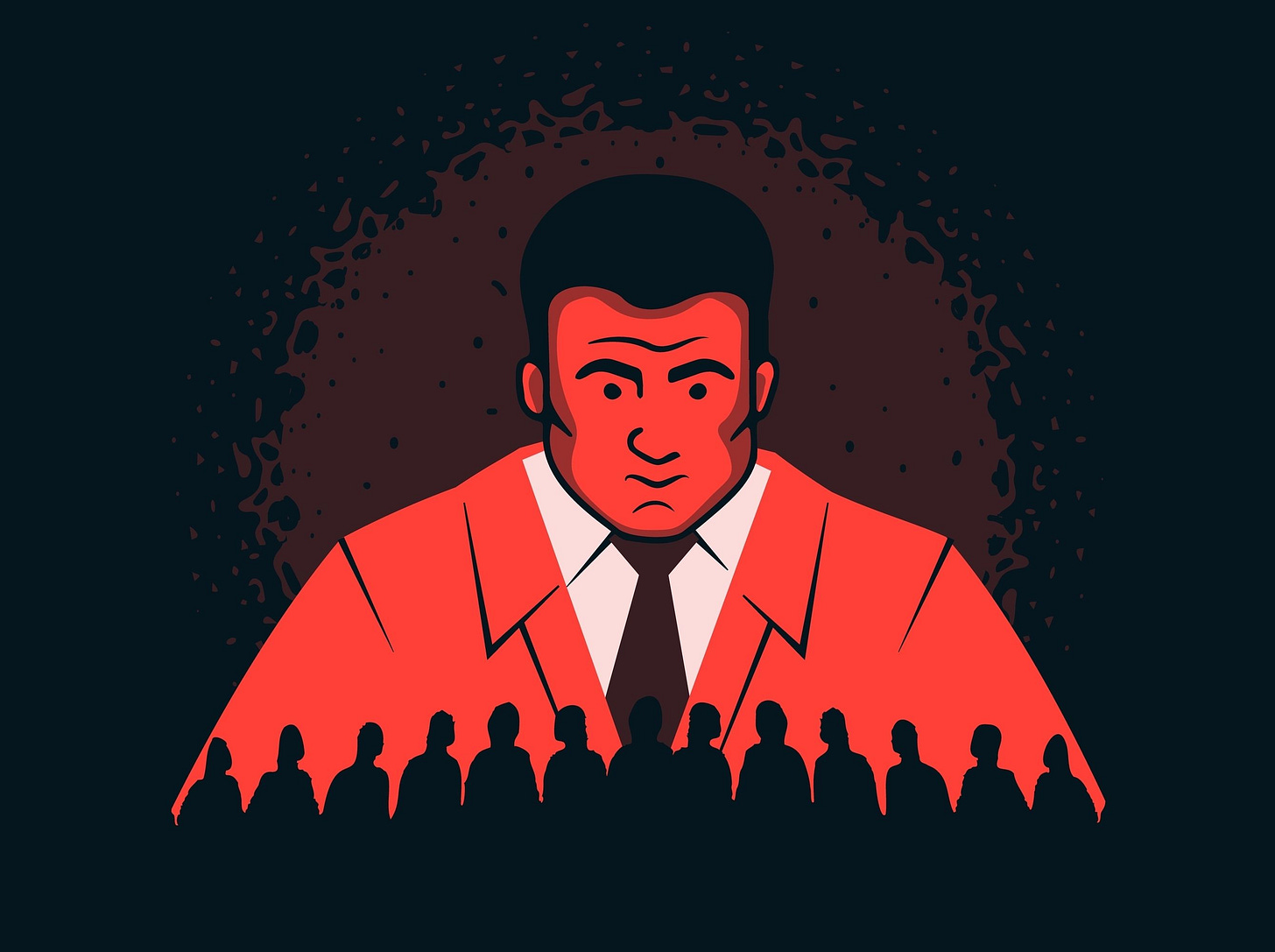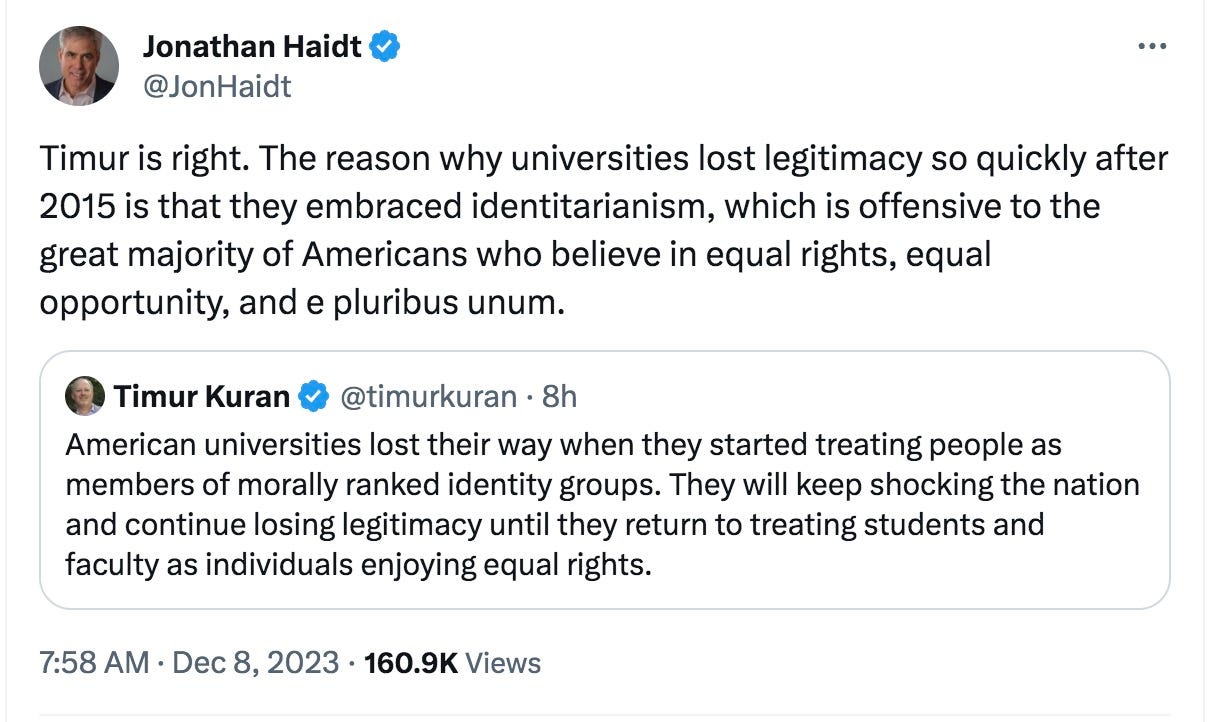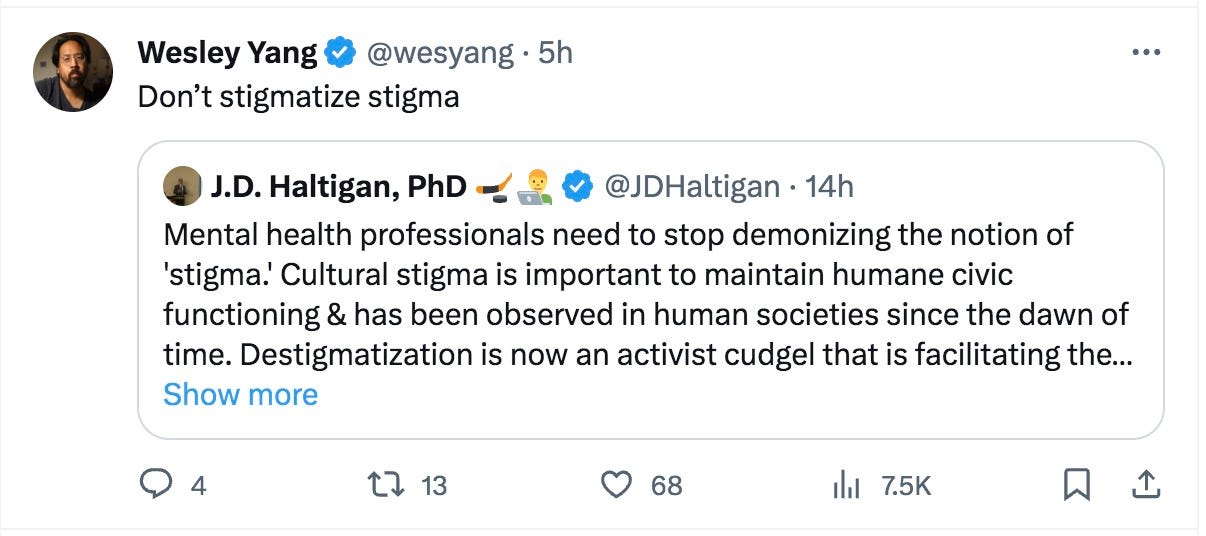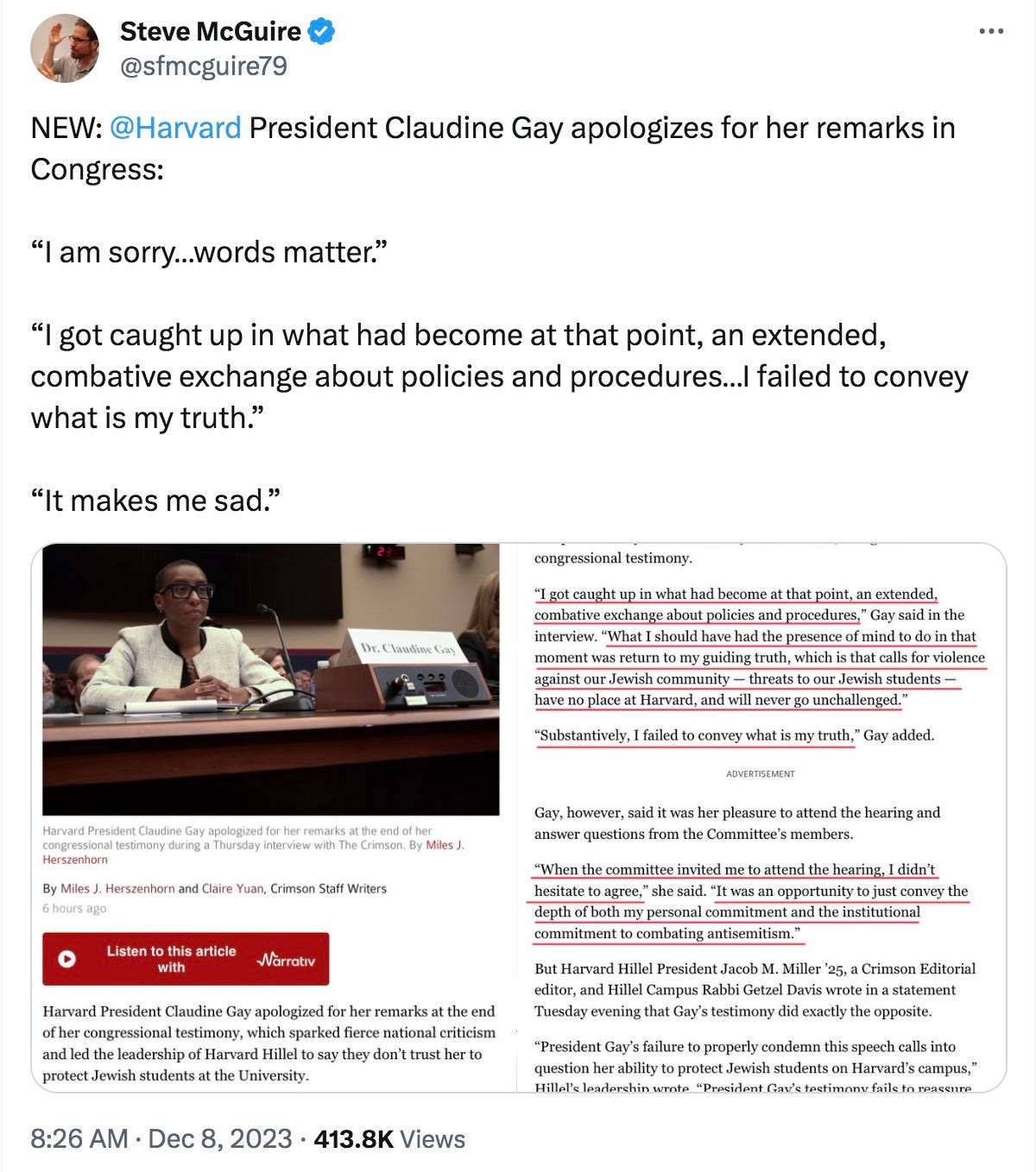E-Pluribus | December 8, 2023
Hypocrisy and free speech; big A, little a, what begins with A? And press freedoms are under assault worldwide—we must not be silent
A round-up of the latest and best musings on the rise of illiberalism in the public discourse:
David Lat: Against Free-Speech Hypocrisy
The testimony of several university presidents before Congress this week has caused an uproar. But the response has not been uniform, despite some strange bedfellows amongst those reacting. David Lat points out at his Substack that we must not allow our revulsion to certain kinds of speech to impact our defense of the First Amendment, even at the extremes.
[W]hen a liberal luminary like Professor Laurence Tribe agrees with a MAGA conservative like Representative Stefanik—he tweeted that President Gay’s testimony was “deeply troubling”—the opinion is probably widely held.
But I respectfully dissent, at least in part, from the widespread criticism of President Gay and two other university presidents, Liz Magill of the University of Pennsylvania and Sally Kornbluth of M.I.T., who similarly refused to flatly declare that calls for genocide can be grounds for student discipline. I dissent “in part” for two reasons.
First, while I’m about to defend some of the substance of the presidents’ remarks, I will not defend—and in fact, I condemn—the style in which they were delivered. For a detailed and devastating critique of the presidents’ insensitive and high-handed manner, see Sarah Isgur and David French of Advisory Opinions.
Second—as my longtime readers know, and as the rest of this post will make clear—I abhor free-speech selectivity. So I do not defend, and in fact I condemn, the many, many times that university leaders, including law school deans, have run roughshod over free expression to advance certain (typically progressive) political perspectives. These are often the very same leaders who, in the words of Greg Lukianoff, “have suddenly rediscovered the value of free speech and academic freedom.” Such inconsistency, even hypocrisy, is utterly unacceptable. And if you read through the Original Jurisdiction archives, you will see me repeatedly calling it out over the years.
Now, on to substance. Let’s start at the beginning. As President Gay testified, Harvard “embrace[s] a commitment to free expression, even of views that are objectionable, offensive, [or] hateful.” But “when that speech crosses into conduct that violates our policies against bullying, harassment, [or] intimidation,” as set forth in Harvard’s Code of Conduct, then the university can and must act, according to Gay.
As the Harvard Code explicitly notes, “speech not specifically directed against individuals in a harassing way may be protected by traditional safeguards of free speech, even though the comments may cause considerable discomfort or concern to others in the community.” I have two things to say about this.
First, the reference to “speech not specifically directed against individuals” makes sense because, as explained by Professor Eugene Volokh in an interesting Northwestern Law Review article, harassment law reflects a distinction between “one-to-one speech” and “one-to-many speech.” If I repeatedly send antisemitic emails and texts to a single Jewish student, that is far more likely to constitute harassment than if I set up an antisemitic website available to the entire world.
Second, the reference to “traditional safeguards of free speech” likely represents Harvard’s intention to incorporate First Amendment jurisprudence, which is what many private universities strive to do in their speech policies. Although private universities, unlike public ones, are not subject to the First Amendment, most of them—especially elite schools like Harvard—profess a robust commitment to free expression that tracks free-speech case law.
Read it all.
Nick Catoggio: Capital ‘A’ and Lowercase ‘a’
For those who missed the Dr. Seuss reference above, here’s a reminder. But Nick Catoggio (Allahpundit for Twitter folks) at The Dispatch isn’t writing about Aunt Annie’s alligator, but rather authoritarians. With Donald Trump still leading the 2024 Republican field by miles, Catoggio looks at what motivates Trump supporters (and those who favor an iron hand in government) and how uppercase- and lowercase-authoritarians differ.
It’s the lowercase-A authoritarians who separate successful authoritarian movements from less successful ones. Every such movement has a charismatic strongman at its center surrounded by a phalanx of fanatic capital-A Authoritarian apparatchiks, but it can’t break big until that nucleus has convinced some critical mass of the population that its program is the least bad option available.
The more desperate a nation’s outlook becomes, the more plausible it is that that critical mass of lowercase-A authoritarians who are willing to entertain dramatic change will materialize. They’re not ideologues—again, most people aren’t—but they’ve reached a point of such exasperation that they’ll give ideologues a try. Many, either not knowing or caring much about civics, might not even perceive a meaningful difference between the ideologues and the regime that preceded them.
They’re not pro-gulag. They’re “Whatever works. Just fix it.”
In 2023, we have the strongman. We have the phalanx of fanatic apparatchiks. And we have a right-wing media industry devoted on the one hand to catastrophizing America’s problems relentlessly, in order to create the requisite sense of national crisis among its audience, and on the other to dismissing complaints about populist misconduct on “whataboutist” grounds, the better to weaken the audience’s sense of what’s truly politically “normal.”
It bears repeating: The capital-A Authoritarians may be pro-gulag, but the lowercase-A authoritarians are not. The latter group remains sufficiently non-ideological, in fact, that pushing too hard too soon on radical schemes would risk spooking them about what they’re being asked to empower. No wonder that figures on Fox News have repeatedly sought to reassure viewers lately that fears of autocracy in Trump’s second term are overblown, never mind the obvious evidence that they aren’t.
Tell Republican voters that Team Trump wants to start throwing reporters in jail and some—emphasis: some, not all or even most—will squirm. They might not vote for a program like that; having spent most of their lives developing a healthy contempt for autocracy abroad, they might even feel embarrassed by it. Assure them that everything will be fine before the big vote, though, and then start throwing journalists in jail afterward …
… and they’re likely to shrug and rationalize it. They committed to a program of trying “whatever works,” didn’t they? Maybe intimidating the media will work. When, not if, Trump defies a court ruling in a second term, maybe that’ll work. When he declares that it’ll be too dangerous for America if he were to leave office on schedule in January 2029, that too might work.
A lowercase-A authoritarian who trusts that he has the country’s best interests at heart and that his enemies don’t will feel obliged to support Trump. Especially if they’re one of the many, many, many Americans who haven’t given things like “enumerated powers” or “judicial review” a second thought since eighth grade.
Read the whole thing.
Roger Ream: Jimmy Lai and the Assault on Press Freedom
For all our squabbling over censorship in the US, we aren’t jailing journalists yet (OK, at least not very often). Writing for the Wall Street Journal, Roger Ream warns us not to get complacent. Rather, we should use our freedoms to stick up for reporters around the world.
Free speech and journalism are under siege worldwide. Mr. [Jimmy] Lai’s imprisonment is only one example. According to Reporters Without Borders, 31 countries had very serious violations of press freedoms in 2023, an increase from 28 in 2022. In Russia, Journal reporter Evan Gershkovich has been detained for eight months under false accusations of espionage. He is the first American journalist to be arrested in Russia since the Cold War. Moscow has also passed a law against publishing material that Russian authorities deem false about the invasion of Ukraine.
Meanwhile in Iran, journalists Niloofar Hamedi and Elaheh Mohammadi were detained by the government and sentenced to six and seven years in prison, respectively, for reporting on the death of 22-year-old Mahsa Amini.
The cases of Mr. Lai, Mr. Gershkovich, Ms. Hamedi and Ms. Mohammadi have a common thread. They are due to authoritarian efforts to curb free speech, suppress truth and maintain power. Journalism doesn’t only break news. It mobilizes people, shapes public opinion and is a beacon of truth amid oppressive governments. No wonder these regimes work so hard to eradicate it.
Every one of us, from journalists at mainstream outlets to everyday people like you and me, has a role to play in fighting this oppression. It’s our duty to those journalists who sit unjustly in prison.
Read it all here.
Around Twitter (X)
Duke professor Timur Kuran on how universities have lost their way:
Via Wesley Yang, the value of stigma:
And finally, via Steve McGuire, Harvard President Claudine Gay believes she has learned the real lesson from her appearance at a congressional hearing this week: “I failed to convey what is my truth.” Well, I think we all feel better now, eh?












I'm a lowly adjunct/lecturer at a Canadian Uni. Free speech? In Canada? At a university? When are we going to try that out?
I called a fellow on LI a Nazi because he wanted Israel destroyed, and because he accused it of all the hip words - "genocide" "ethnic cleansing," - "open air prison" anyone? Students saw it and in the words of CUPE prez, "let the uprising, fire his ass party" begin!
Now I'm suspended. And usually they do fire those they suspend.
Since the AVP already had in for me for all the times when I reminded him that academic rigour, not just bums in seats, should at least be discussed or put in the subject line of some email that comes from an administration domain, it is not looking great.
Officially they want to fire me for damaging someone's human rights. Insulting Hamas is hate speech according to OPSEU (and yes, they are on my side, ouch).
Tender students were apparently hurt by me criticizing Hamas and that might make them them feel "unsafe." When I grew up unsafe was being shitfaced in the North End of Winnipeg at 2:00 am.
I support Israel. Not embarrassed. Hope I keep my job, not ready to retire.